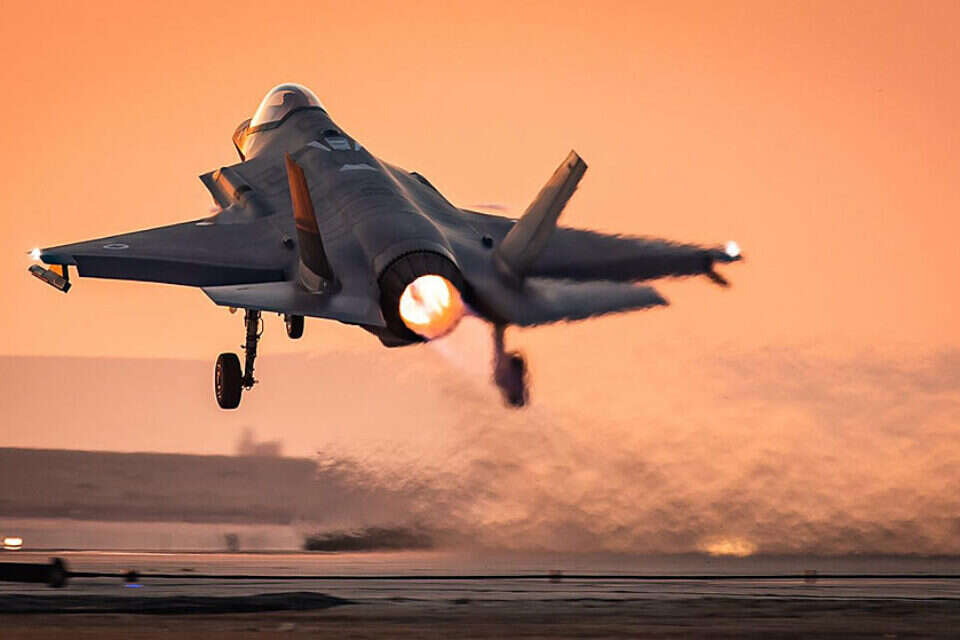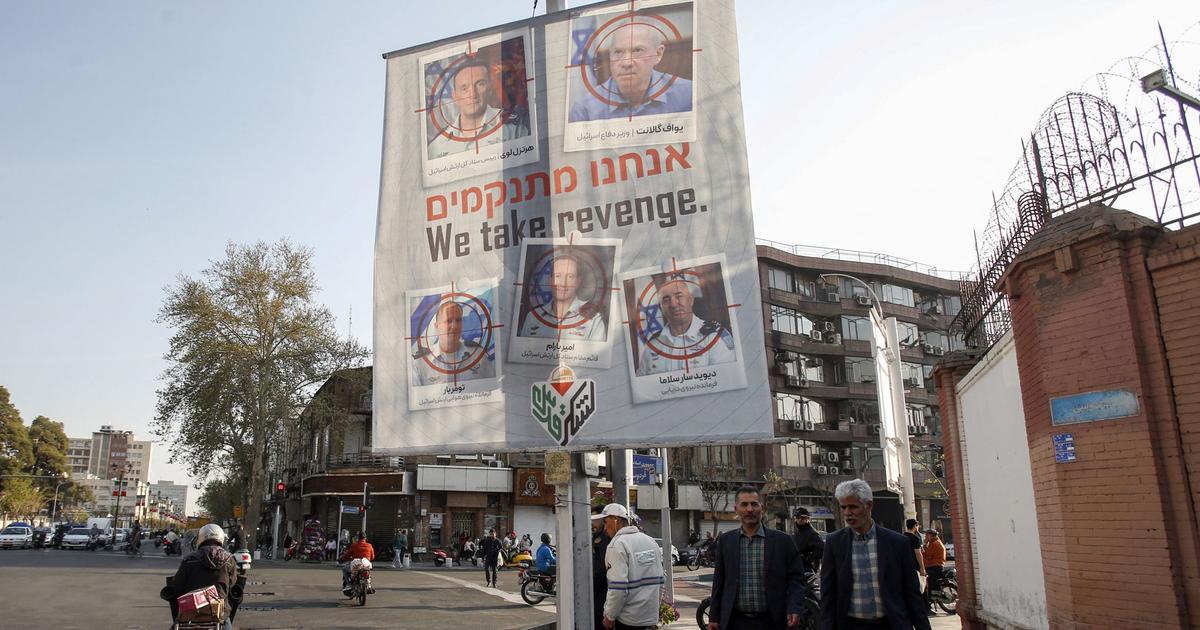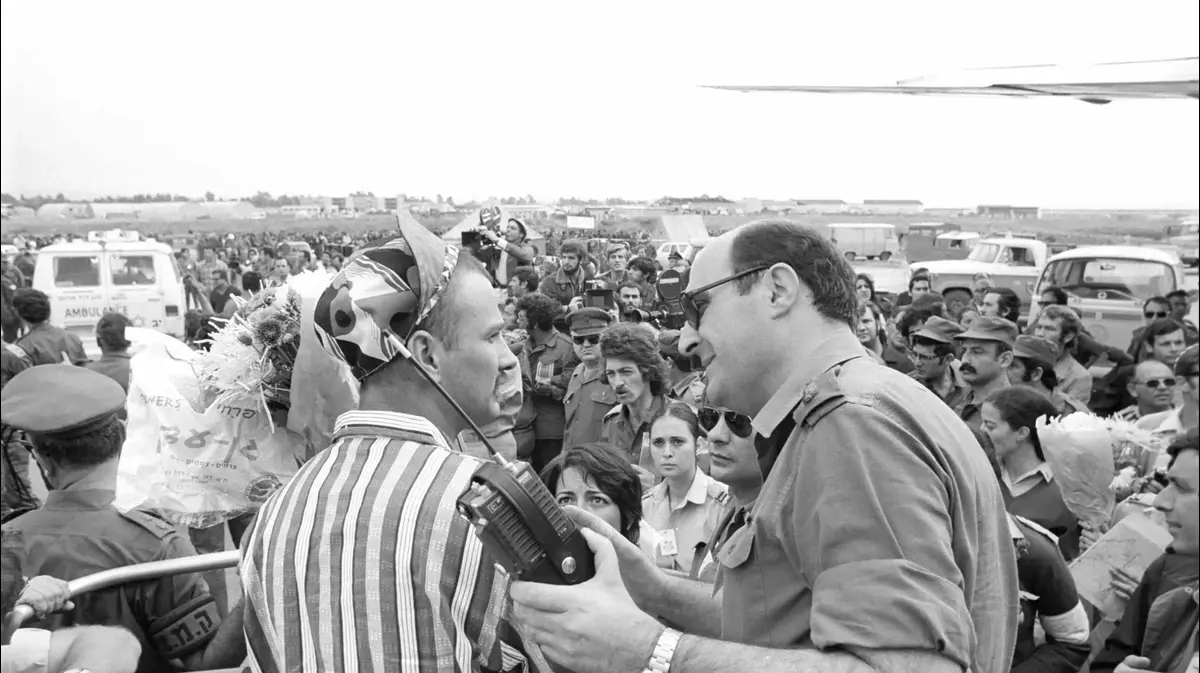Israeli attacks in Syria against Iranian targets have become routine in recent years.
Every few weeks, the Syrian media reports on the operation of Syrian air defense systems against Israeli aircraft.
Just last week, two such incidents were reported - the previous Friday and the following Wednesday.
On Friday, reports focused on an Israeli attack in the area of the Syrian T-4 airport, during which, according to the Syrian news agency, six Syrian soldiers were injured.
Since this is the airport, it can be assumed that the attack was aimed at a target of transferring weapons to Syria.
Late last night, Syrian air defense systems were reported to have been activated south of Tadmor in Homs province.
Additional reports indicated an attack on pro-Iranian militias in the Syrian-Iraqi border area, and the Syrian News Agency said there were casualties in the attack.
The location of the attack indicates that it was apparently aimed at Iranian bases in Syria.
The fact that reports from Syria mentioned the al-Tanaf area indicates that there was probably also some American involvement in the attack, as there is still an American presence on Syrian soil in the area.
Following the unusual attack, an extraordinary statement was issued by the "United Command Room of the Iranian militias", an organization behind Tehran and Hezbollah, in which it was stated, among other things, that they had decided to respond to the attack with a "very harsh" response.
This may be another threat that will not be carried out, but in Israel it is taken seriously, and that is a good thing.
Airstrike in Syria, Photo: Archive, Reuters
The Israeli attacks in Syria are part of the war between the two, the war, the war that Israel is supposedly waging in order to keep the next war at bay. These attacks must preserve ambiguity and allow the Syrian regime some leeway so that it is not pushed into a corner and required to respond to Israeli aggression.
Going back, the idea of a BMA in the Syrian arena was linked in the first place to the chaos that took place in a northern neighbor during the civil war there, when in 2013 it was identified in Israel that the characteristics of the northern arena increase the IDF's operational freedom. Without the use of force it will lead to a large-scale confrontation.
Over the years, the Israeli system has become more sophisticated, and the defense establishment has demonstrated impressive intelligence and operational capability, which has managed to significantly slow down the pace of Iran's establishment in Syria.
The Syrians, for their part, enjoyed the space of denial given to them, and except in exceptional cases, did not respond to Israeli activity on their territory.
But never resilience, and as time went on, the risks to Israeli freedom of action in Syria increased.
Thus, for example, the Russians who are invested in Syria up to the neck are not always satisfied with the Israeli activity, and from time to time disturbing reports emerge from Moscow on this matter.
Also last Friday, the Ministry of Defense in Moscow reported that the attack attributed to Israel in the Tadmor area was carried out "under the auspices of two civilian planes," and it was reported that Syria's defense systems were not activated for fear of accidentally hitting non-military aircraft.
At the same time, and despite other recent reports, senior Israeli officials emphasize in internal talks that the Russians do not restrict Israeli freedom of action, and there is a "hot line" between the parties where there are mutual updates.
Another factor that makes it difficult for Israeli activity in Syria is Hezbollah, which in response threatens any damage to its people, including on Syrian soil. The most notable example of this occurred in July last year, when a Hezbollah operative was killed in one of the attacks attributed to Israel, and Nasrallah's organization threatened revenge. The IDF and the Northern Command found themselves on more than 100 days of alert, during which, thanks to luck and quite a bit, Hezbollah was unable to carry out its threat. , But it also seems that this is no longer enough to maintain Israeli freedom of action in Syria.
Now, the biggest threat to Israeli freedom of action in Syria concerns a change in the internal state of affairs in Syria.
The civil war in Syria, which has lasted ten years, has long since ended, and Syrian President Bashar Assad is doing everything he can to pick up the pieces, and regain control of the country.
As part of Syria's efforts to maintain its sovereignty, in recent months, surface - to - air missiles have been fired at Israeli aircraft participating in the attacks, and the Air Force reports hundreds of missiles fired at Israeli aircraft each year.
From time to time, such a missile crosses into Israeli territory by mistake, and fortunately so far no damage has been caused as a result.
Assad.
Collecting the Fragments, Photo: EPI
But it is not inconceivable that in the end, as part of Assad's desire to regain control of Syria, and of course out of a partnership of interests with Iran which is the main target of Israeli attacks in Syria, Assad's patience will run out and he will take more significant action to make Israel think again. Its UAV policy in Syria. A hint of this, as stated, was seen yesterday in the threat statement issued by the "United Command Room of the Iranian Militias."
One way or another, even if the threat does not materialize in the end, it is worthwhile for Israel to recalculate its course, and analyze the continuation of the MBM policy in light of internal changes in Syria, and with the understanding that the continuation of the existing policy, The opposite, and drag escalation.
Extending the permits to Gazans
In recent days, the Israeli government has announced an increase in the quota of entry permits for "merchants" from the Gaza Strip to 7,000 in order to facilitate the Gaza population.
The move was accompanied by lengthy staff work in the defense establishment, with Defense Minister Bnei Gantz and Coordinator of Government Operations in the Occupied Territories, Major General Rassan Aliyan, expressing support for it, while the General Security Service expressed its security reservations.
From the moment the rumor spread in the Gaza Strip about the distribution of work permits in Israel, masses of Palestinians began knocking on the doors of the trading offices in the Gaza Strip in order to obtain the same work permits in Israel that would allow them to work in construction or agriculture.
For Gaza residents, where the average salary is about NIS 1,200 a month, a work permit in Israel where they earn 6 times as much is a lottery win.
Palestinians stand in line in front of the Jabalya Chamber of Commerce to register for a work permit in Israel, today, Photo: AFP
Israel prefers the issuance of work permits to Palestinian "merchants" over the rehabilitation of the Gaza Strip, since in this case the money goes directly to civilians, workers, and does not go to Hamas, and in fact Israel can help Gaza residents over Hamas' head.
The issue is also easier to digest in the defense establishment, since the condition of rehabilitating the Gaza Strip in resolving the issue of prisoners and missing persons is still arbitrary and exists.
In light of all this, in internal discussions held this week in the Defense Minister's Office, Ganz said he did not rule out increasing the number of Gaza workers by a few thousand more, recalling that on the eve of the Corona, there was staff work to increase quota of work permits to 10,000.
The Israeli hope is that an improvement in the economic situation in Gaza will also lead to an improvement in the security situation, since the price of the loss that the escalation will bring will be higher for the residents of the Gaza Strip.
In light of this, the internal work of the defense establishment is currently focusing on finding mechanisms that will help allay the justified security concerns of the General Security Service, which is disturbed, with a great deal of justice, by daring to roam freely in Israel, gather intelligence for terrorists in the Gaza Strip. To carry out terrorist attacks in Israel.
Defense Minister Ganz.
Expressing support for increasing quotas, Photo: Oren Ben Hakon
Squeaks on land
This past week was a week of exchanges in the IDF. After last week, General Aharon Haliva took over as head of the Armed Forces, this week it was the turn of General Tamir Yedi to be appointed commander of the Land Forces, and of Brigadier General Avi Ballot to be appointed commander of the Judea and Samaria Division.
Maj. Gen. Yedi, until two months ago the commander of the Central Command, reluctantly arrived at his new position, after another general, the commander of the Northern Command, Amir Baram, refused to accept the position.
The IDF raised quite a few eyebrows at Baram's refusal, since the position of commander of the ground arm required a former commander, and Baram was the only one available, who completed enough time in his position as commander-in-chief.
Having no choice, the chief of staff turned to Maj. Gen. Yadi, after serving only seven months in the Central Command. The center, a very short time by all accounts.
This is not the first time that the IDF has struggled to fill the position of commander of the land arm, as it is a full-fledged position with problems, with a lot of responsibility in building the force and very little authority in operating it. "In fact, Strick lost the race for the post of deputy chief of staff, and his chances of advancing, as has been said, are not high.
Stars and knowledge.
The road to improving the land army is still long,
The land is in a bad place.
Despite the chief of staff's remarks at this week's exchange ceremony that "the maneuver has been perfected and improved", one does not have to be a great genius to know that the IDF has not maneuvered anywhere in recent years, and even in Operation Wall Guard last May the minimal ground deception was carried out A lightning strike "planned in advance for the destruction of Hamas tunnels.
As a result, contrary to the original planning and intent in preparing for the operation, only a few Hamas members were killed during the attack, the destruction of the tunnels was only partial and the fighting forces on land again received proof that they were not trusted.
In the background, the harsh criticism of the former Commissioner of Soldiers' Admissibility Commissioner, Maj. Gen. (Res.) Yitzhak Brick, resonates regarding the serious deficiencies in the ground forces and his readiness for war.
Although his remarks were rejected with disgust time and time again by senior IDF officials, there is no smoke without fire, and despite the clear words of the army commanders, the road to improving the ground army is still long.
Thus, it is not clear on what the Chief of Staff's Kochavi's determination this week was based, according to which "when we are required to operate the maneuver ... he will penetrate enemy territory vigorously to bring about a clear victory, in a short time, and at as low a cost to the home front."
To address the problem, the IDF must stop denying it and acknowledge its existence. In the future, the military must continue to look for solutions for significant land-based revision, and internalize that modern technologies and exploding concepts will fail to bring about the desired change.
The most significant challenge on land, which a knowledgeable champion also intends to focus on, is manpower whose quality has been declining over the years.
The IDF always explains that the ranks are full and there are enough contenders for every command post, but in practice, many of the quality commanders want to retire after RPG positions, and the feeling is that except in special units or small islands of excellence, mediocrity takes over the army.
The IDF can bring all the most sophisticated weapons, fill the gaps, and equip itself with the latest technologies that have just hit the market, but if it fails to retain the good people, it will not be able to make the necessary change in ground forces and restore decision-makers' trust. .







/cloudfront-eu-central-1.images.arcpublishing.com/prisa/AJG7IZEA3JGX3NF54WRHHWVVPU.jpg)

